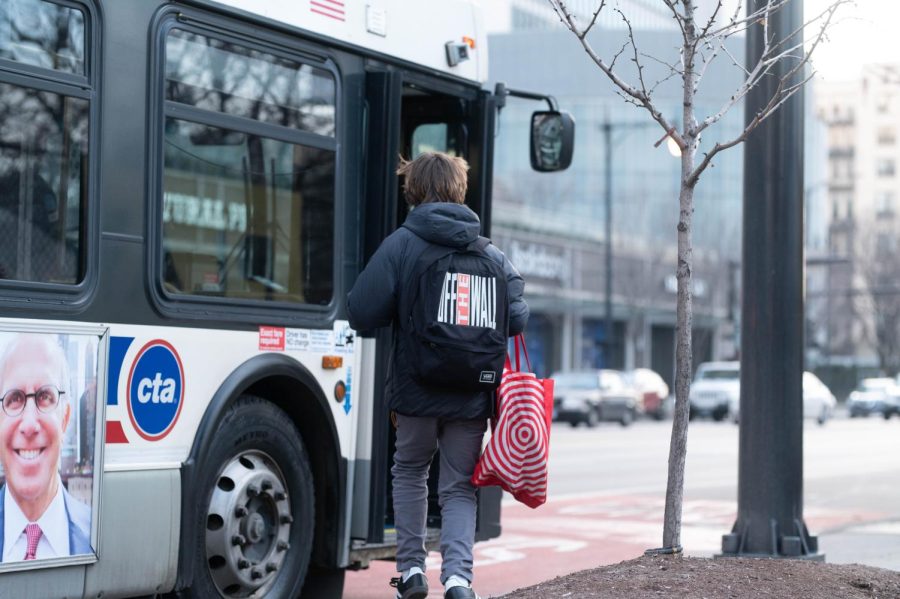Chicago’s winter weather greatly impacts low-income residents
Chicago’s brutal winter weather creates significant roadblocks for low-income households and communities the most.
March 2, 2023
Frost forms on the window outside. The icy tile floor emanates a chiling coldness. She is confined to share an overcrowded, underheated room due to financial struggles. The upper floor of the house remains abandoned.
This is an annual reality for Yatziri Ortiz, who is among one of many Chicagoans who will have difficulties affording heating this winter, and the struggle is just one of many that winter will bring to residents.
According to the National Energy Assistance Directors Association, the average cost to heat a home this winter will rise to over $1,200, an 18 percent increase from last winter.
This stark increase is one many families will, unfortunately, struggle to afford this winter.
Nearly one in five households has reduced or outright denied necessities like food or medicine due to energy bill costs, according to a 2015 EIA Residential Energy Consumption Survey.
Though escalating electric bill prices are just one obstacle Chicago’s winters present, winter provides issues for low-income households and communities the most.
Ms. Ortiz, a nursing student at Malcolm X College, who currently lives with extended family on the South Side, faces difficulties every winter. However, this one has put a much higher financial strain on her family.
Recently their heater broke, which had posed additional expenses due to the cost of contracting someone to fix it as soon as possible, she said.
Additionally, Ms. Ortiz said for the heat to reach upstairs into the attic, where her brother stays, the temperature needs to be high. With heating costs on the rise, this necessity is often not a possibility.
“My brother even has to come downstairs and sleep with us in the basement because of how cold it gets up there,” Ms. Ortiz said.
Ms. Ortiz believes that while the city does a decent job of taking care of streets in the winter, certain areas are maintained better than others.
“I live up in the South Side of Chicago, and they don’t do the best as they do in certain other areas of Chicago,” she said.
A significant obstacle winter presents for Kayla Gallagher, who works multiple jobs, has been the CTA, on which she relies for transportation.
She believes that in winter CTA is often inaccurate to their scheduled stop times and there is a lack of adequate shelter from freezing temperatures, which can make getting to work on time difficult.
“Like, sometimes you have to wait 25 minutes for a train in zero-degree weather,” Ms. Gallagher said.
Also, Ms. Gallagher believes that accessibility to public transportation is not equally dispersed across the city, making it harder for people in certain areas to utilize it.
“If you look north, you have a train land that can take you just about anywhere but the second you get past, like, the Loop area and go South, you just have the Red Line and the Green Line, which are miles apart from each other,” Ms. Gallagher said. “I just think that there needs to be more accessible transportation for the South Side of Chicago.”
While Chicago’s winters pose difficulties for everyone, she believes that there are not a sufficient amount of outreach programs, such as food drives or clothes drives, to help those who need it.
“I would just love to see Chicago do more outreach to the community, especially those communities who struggle [during winter],” Ms. Gallagher said.
One of these charities helping marginalized groups during wintertime is SocialWorks’ Warmest Winter. SocialWorks is a Chicago-based nonprofit organization founded by Chance the Rapper in 2016. Through donations and events, it aims to promote awareness and give assistance to those experiencing hardship. So far, it has accumulated over 156,378 winter warming items.
According to SocialWorks volunteer Kristen Fasano, one way to deliver donations is at charity events, such as the A Night At The Museum event on Dec. 16. These are then taken to a sorting center.
She believes that SocialWorks is a nonprofit which is worth supporting because of the opportunities it gives to those who need it most.
“I really like SocialWorks,” she said. “I think it’s a great organization and provides a lot of opportunities.”
Chicago is home to numerous outreach programs and valuable opportunities to help those facing difficulty with the cost of winter, in particular, low-income communities. SocialWorks is among the local organizations that provide a way to make a positive impact to reduce the disproportionate burden of winters.
“I feel like I don’t hear enough about those things,” Ms. Gallagher said. “I’m somebody who would love to participate in those things.”




























































